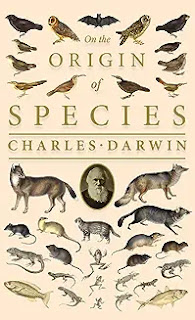How did Charles Darwin go about systematically deciding whether or not to get married, and how can this help us to make better, more thoughtful decisions?
Subject: Pros and Cons - Darwin Contemplates Matrimony
Event: Birthday of Charles Darwin, 1809
Today is the birthday of Charles Darwin (1809-1882), the Victorian naturalist known for the theory of evolution. From 1831 to 1836, Darwin sailed aboard the HMS Beagle to the Galapagos Islands and the coast of South America. Based on the observations he made on this five year trip, Darwin published, in 1859, the single most influential book of the nineteenth century, On the Origin of Species by Means of Natural Selection, or Preservation of Favored Races in the Struggle for Life. Darwin’s work not only revolutionized science, especially the fields of biology and anthropology, but it also sparked furious philosophical, religious, and ethical debates–debates that continue even today.
After his five-year voyage, Darwin returned home to an intense internal debate, not about issues of science but issues of matrimony. Having fallen in love with his first cousin Emma Wedgwood, Darwin contemplated whether or not to pop the question. Being a scientist, he approached the matter in a rational and methodical manner, sitting down and writing out a list of pros and cons.
Image by 巻(Maki) from Pixabay
Under the heading “Marry” some of the notable arguments for having a wife were “Constant companion . . . better than a dog” and “someone to take care of house.” As for the cons, under the “Not Marry” heading, he listed, “Less money for books” and “cannot read in the evenings.” Despite the fact that Darwin’s “Not Marry” column included more reasons than his “Marry” column, we know that in the end, he decided to marry. He and Emma were married on January 29, 1839. They had ten children and remained married until Charles died in 1882 (1).
Of course, Darwin was not the first to use the pros and cons method of decision making. It dates back to Roman times. “Pros and cons” is derived from the Latin pro et contra, which translates into English as “for and against.” Another noted man of science who advocated the pro et contra method was Benjamin Franklin. He wrote a letter to a friend on September 19, 1772, in which he praised this rational method of putting your thoughts on paper:
And tho’ the Weight of Reasons cannot be taken with the Precision of Algebraic Quantities, yet when each is thus considered separately and comparatively, and the whole lies before me, I think I can judge better, and am less likely to take a rash Step; and in fact I have found great Advantage from this kind of Equation, in what may be called Moral or Prudential Algebra. (2)
It was the Greek tragedian Sophocles who warned, “Quick decisions are unsafe decisions.” A pros and cons list is a great way to slow down your thinking and force yourself to see at least two sides of an issue.
Recall, Retrieve, Recite, Ruminate, Reflect, Reason: What key life-decision was Darwin contemplating, and what method did he use to help him decide?
Challenge - Decisions, Decisions: What are some of life’s major decisions that require the kind of careful thought and deliberation that require a pros and cons list? Create your own pros and cons list based on an important life decision that you might make in the future. Force yourself to go beyond your own biases by trying to create a list that has a balanced proportion of pros and cons. With Valentine’s Day drawing near, for example, you might consider whether or not to pursue a relationship with a significant other. Below are some other examples of crucial life decisions:
Marry/Don’t Marry
Go to College/Don’t Go to College
Own a Pet/Don’t Own a Pet
Buy a Home/Rent a Home or Apartment
Buy a New Car/Lease or Buy a Used Car
Have Children/Don’t Have Children
Staycation/Vacation
Work for a Company/Be Self-Employed
ALSO ON THIS DAY:
-February 12, 1809: Abraham Lincoln was born on this day in a log cabin near Hodgenville, Kentucky. He said, “People are just as happy as they make up their minds to be.”
-February 12, 2002: U.S. Secretary of Defense Donald Rumsfeld presented what we might call the “Gettysburg Address of Epistemology” when he discussed evidence regarding Iraq’s possession of weapons of mass destruction:
Reports that say that something hasn't happened are always interesting to me, because as we know, there are known knowns; there are things we know we know. We also know there are known unknowns; that is to say we know there are some things we do not know. But there are also unknown unknowns—the ones we don't know we don't know. And if one looks throughout the history of our country and other free countries, it is the latter category that tends to be the difficult ones.
Sources:
1-”A Wife is Better Than a Dog: Darwin’s Reason for Marrying” The Telegraph. 12 Feb. 2016.
http://www.telegraph.co.uk/books/authors/a-wife-is-better-than-a-dog-charles-darwins-main-reason-for-marr/
2-Benjamin Franklin's Rule for Making Decisions. FS Blog.
3-Shermer, Michael. “Rumsfeld's Wisdom” Scientific American 1 Sept. 2005.





No comments:
Post a Comment